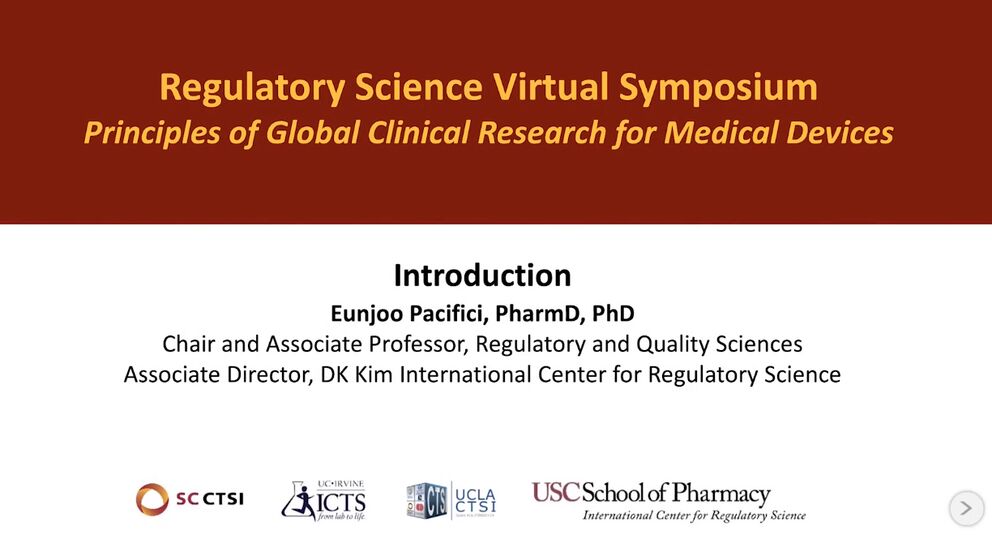1. GCP-ISO 14155
a. Key learning objectives:
i. GCP aspects for medical devices, how they differ from pharmaceuticals
ii. Requirements of ISO 14155 regarding demonstration of benefit-risk profiles of medical devices
iii. Determine different study phases in a medical device global clinical strategy
2. ISO 14155:2020 – Scope
a. This International standard addresses good clinical practice for the design, conduct, recording and reporting of pre-market clinical investigations carried out in human subjects to assess the clinical performance or effectiveness and safety of medical devices
b. Try to avoid using efficacy instead use effectiveness for medical devices
3. ISO 14155:2020 – Applicability
a. Annex I: Clinical Development Stages
i. Innovative medical devices will need a pilot stage
b. Annex I Section 7: Suggested waivers
i. Informed consent is not waived for interventional studies, varied for noninterventional studies
4. ISO 14155:2020 – Scope
a. This standard is horizontal, meaning it applies to all medical devices
b. ISO is not here to overrule any international requirement
c. Another standard (ISO 20916) exists for in-vitro diagnostics (IVD), so ISO14155:2020 does not apply to IVD
5. ISO 14155:2020 – Summary of GCP
6. ISO 14155:2020 – General
a. Must register that you are going to conduct the study as well provide updates
b. A sponsor must have readily access to an individual with medical expertise in the area of the medical device
c. Parts of this standard aligns with ICH-GCP
7. ISO 14155:2020 – Ethics – Informed Consent
a. Subjects must be informed about whether the data may be exported to foreign countries, what will be done with sample taken and stored for future use
b. This is in accordance with data protection regulations
c. Add a name of contact person in addition to informed consent in case subject does not respond
8. ISO 14155:2020 – Risk Management
a. Positions the device within the area of clinical protocol of the intended disease by looking at standard of care and the risks of current avalible therapies and interventions, and the prevalence of the disease
b. When developing this plan, ask: “Is the quality systems strong enough to pick on thresholds and things that can go wrong i.e. non-compliance by subjects, investigators?”
9. ISO 14155:2020 - Risk Management – Annex H
a. ISO 14971 activities
b. ISO 14155 activities
10. ISO 14155:2020 - Risk Management
a. European regulations recommend that post-pandemic, to revert to onsite monitoring
b. Monitoring plan
i. Evaluate project risks
ii. Establish mitigation – monitoring etc.
iii. Pre-define thresholds – escalation
iv. Monitor and report escalation
v. Suspend/Implement CAPAs
vi. Verify
11. ISO 14155:2020 – Quality Management
a. Provide guidance on readiness of investigational device for human use
b. Documentation of good manufacturing processes
c. Requirements for written procedure to handling non-conforming products
d. Management of product related CAPA
e. Need for updating IB with design changes if any
f. How to deal with “unused investigational devices”
g. Some integration of clinical quality system with overall company quality system
12. ISO 14155:2020 – Annex A – Clinical Investigation Plan – What is new?
a. Sometimes devices are so new, so there is no control/comparable device so absence of controls can be justified
b. Pilot studies are conducted to see whether the primary endpoint is possible i.e. resorbable devices
c. Consider the intended treatment population when deciding on eligibility criteria
d. Vulnerable population definition change
i. Discussion to separate pregnant and breast-feeding populations
e. Provide provisions on Device Accountability, statements of compliance, financial disclosures, device deficiencies
13. ISO 14155:2020 – Overview of Annexes
a. Normative Annexes
b. Informative Annexes
c. Annexes should be considered at the same level of importance as the body of the text
14. ISO 14155:2020 – Quality Management
a. Published July 2020
b. Immediately implementable
c. Harmonization to MDR?
d. This standard is considered state of the art so use for any study aiming to register under MDR!
e. Stop using the 2011 version
15. Key Points
a. GCP for medical devices is similar but differ from pharmaceuticals
b. ISO 14155: international standard that supports companies generating global data for medical devices because it is recognized by numerous countries around the world
16. General Discussion
a. Panelists addressed questions relating to the two previous sessions
Regulatory Science Virtual Symposium: “Principles of Global Clinical Research for Medical Devices” Session 3: Good Clinical Practices and ISO 14155 (2021)
Course Syllabus/Topics
Acknowledgement
Accompanying text created by Annie Ly | Graduate Student, Regulatory Science, USC School of Pharmacy lyannie@usc.edu

